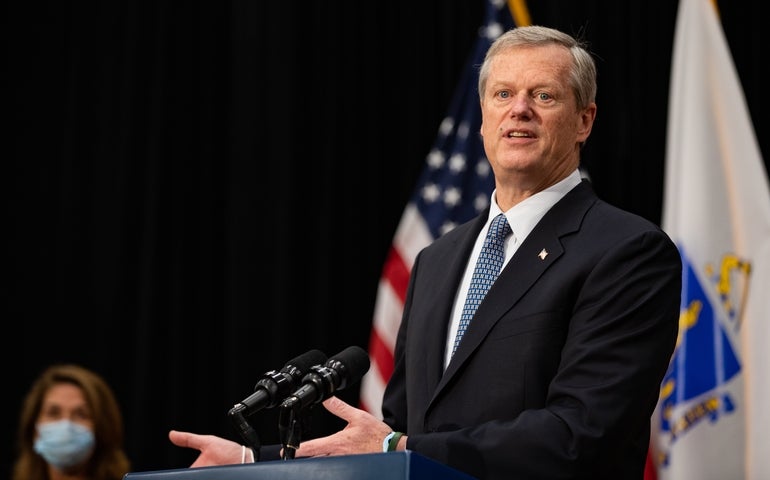Baker: Virus trends show no signs of changing
 Photo | SHNS
Gov. Charlie Baker
Photo | SHNS
Gov. Charlie Baker
The second surge of COVID-19 in Massachusetts is showing no signs of slowing down, Gov. Charlie Baker said Tuesday as he and hospital officials outlined steps they are planning to treat the growing number of people with the disease, including plans for the re-establishment of emergency field hospitals.
Since Labor Day, coronavirus cases are up more than 300 percent and COVID-19 hospitalizations are up nearly 200 percent, Baker said, which has driven occupancy at Massachusetts hospitals up to 67 percent overall and to 50 percent at the intensive care unit level.
The state's COVID-19 trends are headed in the "wrong direction and show no signs of changing," he said.
With an eye on the trends and the growing number of people with COVID-19 in the hospital -- it increased by 30 to 618 people as of midday Tuesday -- Baker said Massachusetts hospitals will be able to convert 400 acute care beds into ICU beds, if needed, and that his administration is planning for the return of field hospitals like the ones established this spring in Worcester, Boston, on Cape Cod and elsewhere.
More details on the location of the new field hospitals will come later this week, the governor said.
"COVID-19 has now been with us for the better part of a year and we've learned a lot about how to address this terrible virus. In addition to building a massive testing and tracing infrastructure, we've also executed on plans to better manage our health care systems during a pandemic," Baker said. "Our experience from last spring shows that creating enough space to safely treat COVID-19 patients and other patients throughout our health care system is the single most important aspect we have in navigating the pandemic as safely as possible, and being prepared for every scenario is critical."
Joining Baker at the State House on Tuesday were Jody White, CEO of Lowell General Hospital, and Kate Walsh, president and CEO of Boston Medical Center, who said that this second surge of COVID-19 will be very different from the April surge that strained hospital resources.
"I know there are concerns about increased hospitalizations, but we are prepared. We're prepared for increased COVID patients and we remain confident that we will not see the numbers that we saw during the first surge," Walsh said. She added, "While the rising cases that we are seeing in our state causes apprehension and we know we cannot underestimate this virus, the Massachusetts hospital community is in a very different position today than we were last spring. We are well prepared for a second surge. It'll be much less disruptive to our operations. And there are several reasons why we're more confident."
Testing capacity has dramatically increased since the spring -- Baker said the state could handle 2,000 tests per day in March and now averages 73,000 tests per day -- which has allowed hospitals to build predictive models and set up early warning systems, Walsh said. And hospitals have established lines of communication to compare notes on treatment protocols and ways to "reimagine" spaces within hospitals to treat COVID-19 patients.
"Another key difference is that we have sufficient personal protective equipment on hand," Walsh said. "Last spring at Boston Medical Center, we were counting PPE in days. Now, we're counting in months and we have a year's supply of hard-to-acquire items."
White, who leads Lowell General Hospital, said doctors, nurses and hospitals learned a lot about COVID-19, its symptoms and ways to treat them from the springtime wave of cases and used the summer, when the virus had receded somewhat, to begin getting ready for this fall and winter.
White, Walsh and others said the administration and hospital community are trying to avoid having to cancel elective procedures and want people to feel comfortable getting care for something other than COVID-19 at a hospital.
"I want to give the residents of Massachusetts a sense of confidence; confidence that our hospitals and our health care organizations across the commonwealth are safe and are prepared. You are safe with us," White said. "Now, we don't know precisely what the second wave of COVID might look like, but we are in a much stronger position to respond because of the many lessons learned from the unprecedented challenges that we faced earlier this year."
Health and Human Services Secretary Marylou Sudders said there were fewer than 3,500 people treated for something other than COVID-19 at Massachusetts hospitals in the third week of April and that today the hospitals are treating 7,000 people for something other than COVID-19.









0 Comments